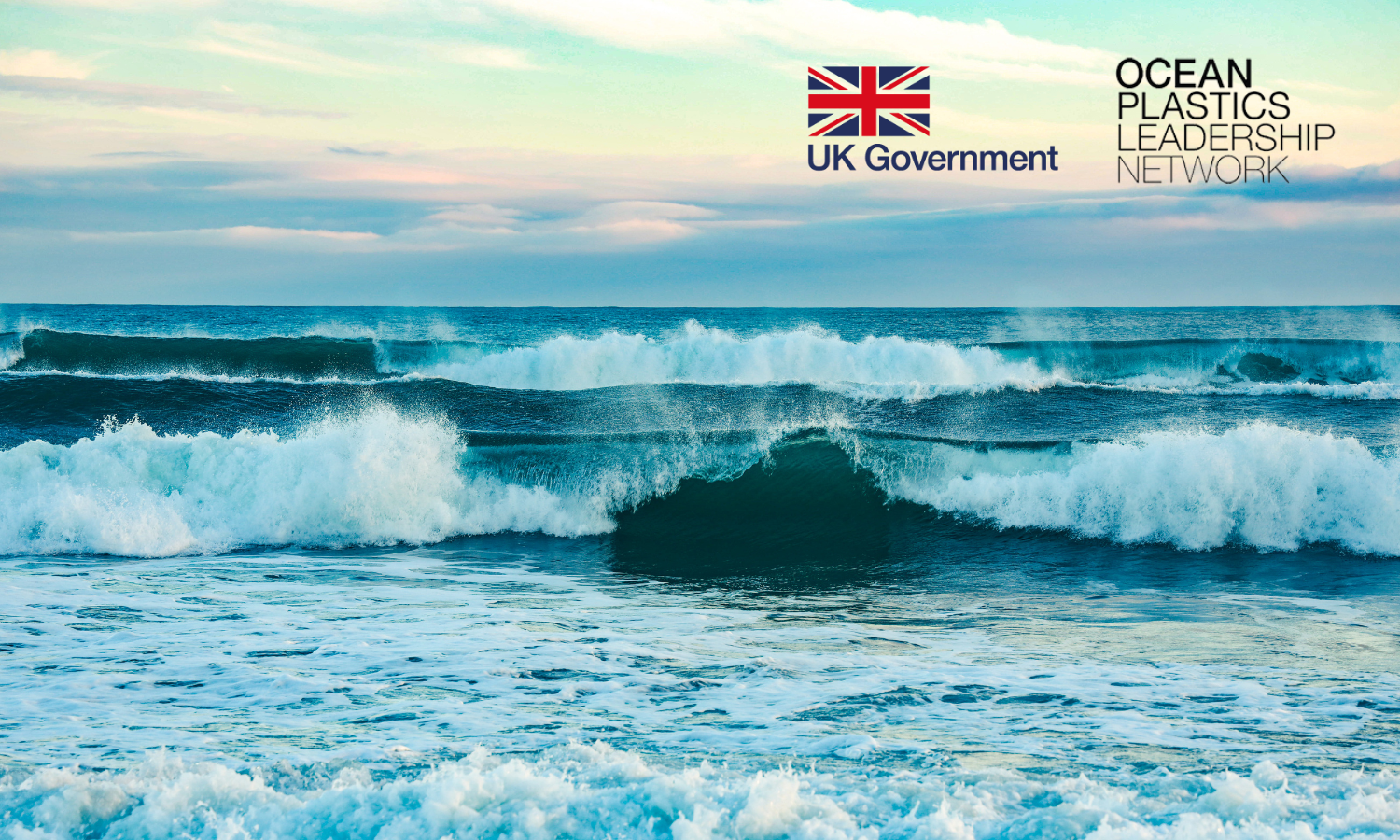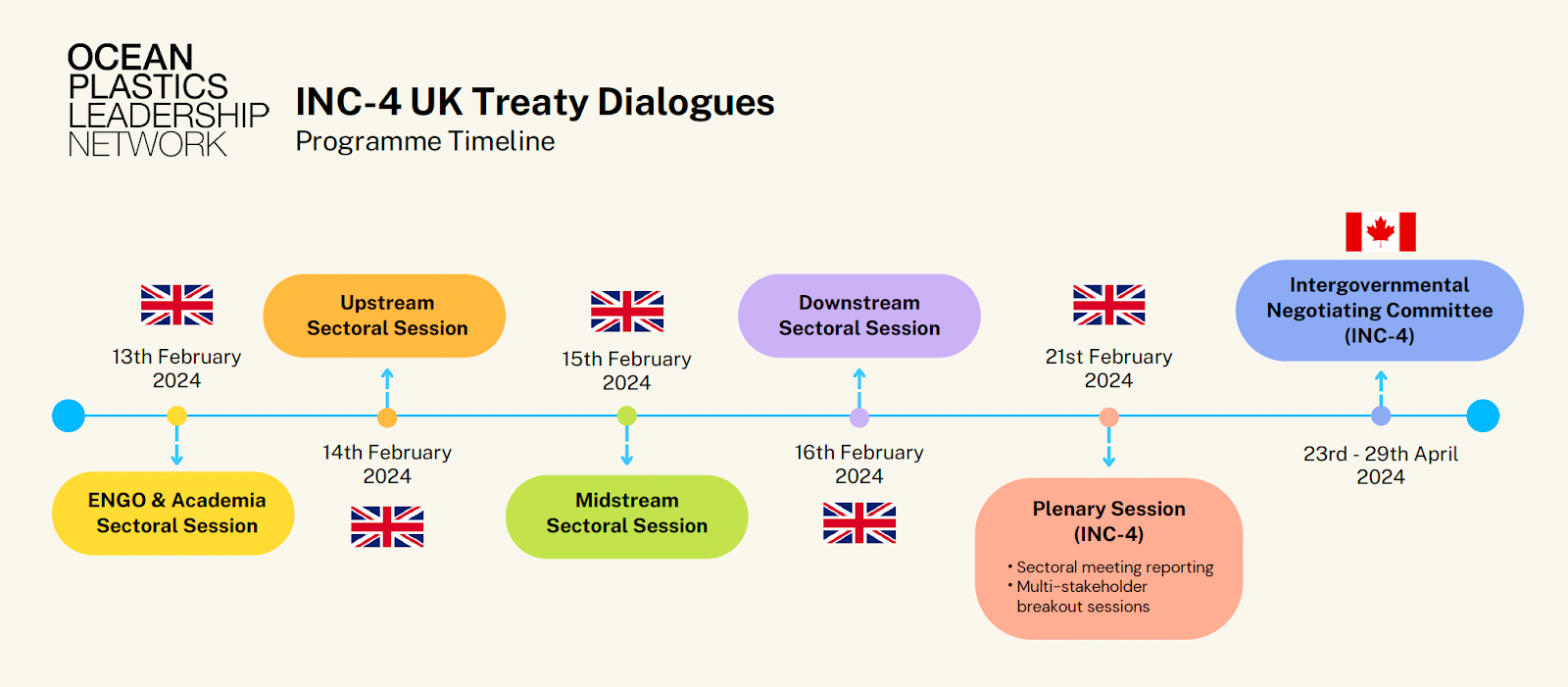OPLN will host UK Multi-Stakeholder Convening Series Ahead of INC-4 in Ottawa, Canada

In partnership with the UK Government, OPLN will host the fourth series of the UK National Treaty Dialogues for Plastic Pollution - a multi-stakeholder convening programme designed to inform the UK position in the UN Plastics Treaty negotiations ahead of INC-4 in Ottawa, Canada on the 23rd - 29th of April, 2024.
This invitation-only programme composed of four sectoral meetings and a plenary session:
- February 13th, 2024, ENGO & Academia Sectoral Session (ENGO, academia, research)
- February 14th, Upstream Sectoral Session (oil & gas, petrochemicals and packaging converters)
- February 15th, Midstream Sectoral Session (CPGs, retail, fisheries, SMEs)
- February 16th, Downstream Sectoral Session (waste management, recyclers, SMEs)

James Smith, Deputy Director for Marine Policy, Defra said:
“The UK strongly values the active and meaningful participation of stakeholders at all stages of the INC process, so we can take on board your expertise, knowledge and experiences to drive forward global change and bring us one step closer to tackling plastic pollution.”
The UK National Treaty Dialogues for Plastic Pollution commenced with the first session on November 1st, 2022, ahead of INC-1 in Uruguay. Since then, OPLN has brought together over 60 organisations across the UK plastics ecosystem systematically in conjunction with the official treaty schedule to inform the negotiations process of the Global Treaty for Plastic Pollution. In October, 2023 OPLN received ministerial approval for continuation of this program throughout the INC-5 with match funding from the UK government.
Reports from OPLN’s UK National Treaty Dialogues are available here:
- INC-3: Nairobi, Kenya - November 2023
- INC-2: Paris, France - May/June 2023
- INC-1: Punta del Este, Uruguay - November 2022
What to expect from the INC-4 UK National Dialogues Series?
Through dedicated working groups, the program prioritizes sectoral collaboration (upstream, midstream, downstream and ENGO & Academia) and informs cross-sectoral engagement through a plenary format.
The participants will have an opportunity to delve into the key treaty considerations first in a working group format and then jointly review and provide feedback on the contributions of other groups through the plenary session including presentations, panel discussions and breakout session.
In preparation for INC-4 negotiations stakeholder groups will focus on identifying minimum technical requirements for treaty provisions including but not limited to:
- International vs Nationally Determined Obligations
- Sectoral Approach including Provisions and Exemptions
- EPR
- Trade
- Transparency Requirements
- Design Harmonization Criteria
The program is supported by the stakeholder sentiment survey which enables effective and systemised identification of cross-sectoral alignment in relation to treaty text.
For example, during INC-3 convening, OPLN deployed a sentiment survey to capture further insights from the participants of the dialogues. Based on the multi-stakeholder survey responses we identified 5 cross sectoral areas of alignment:
- Monitoring - Introduce measures on reporting that are standardized globally.
- Sectoral Approach - Take a sectoral approach to core obligations.
- Transparency - Introduce global obligations on transparency of plastic products.
- Global Waste Management Infrastructure - Look to create conditions to encourage consistent, equitable and sustainable investments in waste management infrastructure, considering existing global disparities.
- Design Standards - Introduce globally harmonized design standards for plastic polymers and products.
The survey also provided insights into areas of the Zero Draft text which require additional recommendations:
- Funding Mechanisms - Respondents of the survey provided neutral or negative sentiment on leveraging existing funding mechanisms as a modality for UN Treaty means of implementation in the context of management and reporting of funds accrued and dispersed under the instrument.
- Misleading Environmental Claims - Upstream, Downstream, NGO & Academia respondents agree that the Treaty for Plastic Pollution should address greenwashing and misleading environmental claims on alternative plastics.
- Production - The survey results show that industry respondents lack alignment around production caps and establishing targets for virgin polymer production in some form
In 2023, The UK Dialogues brought together voices and perspectives from 46 impact organisations central to the plastics crisis, including stakeholders from:
- A Plastic Planet
- Alpek Polyester
- Beauty Kitchen
- Berry Global
- British Plastics Federation (BPF)
- Common Seas
- DOW Chemical
- Eastman Chemical
- EMPA: Swiss Federal Laboratories
- Environmental Investigation Agency (EIA)
- Estée Lauder
- Fauna & Flora
- Greenpeace
- INEOS
- Innovate UK KTN
- International Alliance of Waste Pickers
- John Lewis & Partners
- Kimberly-Clark
- Kraft-Heinz
- LEGO Group
- Mars Wrigley
- Matter Industries
- McDonald's
- Minderoo
- Nestlé
- Notpla
- Ocean Conservancy
- Odessey Innovation Ltd.
- Plastics Europe
- Plymouth Marine Laboratory
- SUEZ
- Tearfund
- The Coca-Cola Company
- Unilever
- University of Birmingham
- University of Leeds
- University of Manchester
- University of Plymouth
- University of Portsmouth
- University of St. Andrews
- Waitrose
- World Economic Forum (WEF)
- Women in Informal Employment: Globalizing & Organizing (WIEGO)
- The Waste and Resources Action Programme (WRAP)
- World Wildlife Fund (WWF)
For questions about the programme or invitation requests , please contact: Marta Fiscina at marta@opln.org.